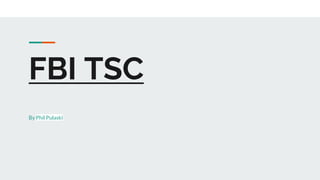
FBI TSC
- 1. FBI TSC By Phil Pulaski
- 2. Introduction Phil Pulaski has 38 years of law enforcement experience and was the New York City Police Department’s (NYPD) Chief of Detectives where he was responsible for 3,600 personnel. During his more than 33 years serving with the NYPD, Phil Pulaski managed patrol, investigative, counterterrorism and other public safety operations. In the immediate aftermath of the September 11, 2001 terrorist attacks, Phil Pulaski managed the NYPD’s counterterrorism and weapons of mass destruction operations. He also supervised jointly with his FBI counterpart numerous terrorism related investigations including the 9-11 World Trade Center attack and October 2001 anthrax attacks. Phil Pulaski also was responsible for NYPD’s intelligence collection and analysis operations, and the daily counterterrorism deployments in NYC involving more than 300 uniformed personnel as well as aircraft and watercraft.
- 3. Following the terrorist attacks of September 11, 2001, the President and Congress mandated that federal executive departments and agencies share terrorism information with those in the counterterrorism community responsible for protecting the United States. In 2003, the Terrorist Screening Center was created to fulfill that mandate. The Terrorist Screening Center is a multi-agency center administered by the FBI. The Terrorist Screening Center is the counterterrorism watch-listing element of the U.S. Government, and is responsible for the management and operation of the Terrorist Screening Database. The Terrorist Screening Center is a critically important element of the U.S. Government’s counterterrorism early warning and interdiction network. Federal, state and local law enforcement agencies rely on the information provided by the Terrorist Screening Center to protect the United States from a terrorist attack.
- 4. The Terrorist Screening Database is a single database that contains sensitive national security and law enforcement information concerning the identities of those who are known or reasonably suspected of being involved in terrorist activities. The Terrorist Screening Center uses the database to support front-line screening agencies in positively identifying known or suspected terrorists who are attempting to obtain visas, enter the country, board an aircraft, or engage in other activities.
